by M. C. Jennings | Sep 6, 2022 | Academics, COBA Faculty, College Decisions, Faculty Testimonials, Faith Infusion, Management Information Systems, Uncategorized
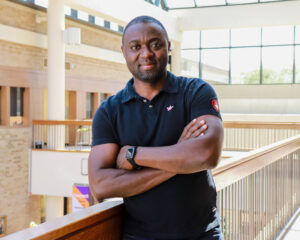 Written by special contributor Lance Fleming
Written by special contributor Lance Fleming
Growing up in Cameroon as the oldest child in a family of five, Dr. Joseph Manga never imagined where his life would take him.
Four different universities for undergraduate, graduate, and doctoral work, as well as tutoring and teaching experience, have all been part of the experience. And this past summer, it led him to Abilene Christian University and the College of Business Administration where he is teaching Management Information Systems.
Manga now joins the full-time faculty as a tenure-track assistant professor of Information
Systems and Management Science. None of this was what Manga expected to be his life’s work
while living in Cameroon. But as he would come to learn, God had other plans for his life.
“As we know, many may be the plans in a man’s heart, but the Lord determines the end,” he
continued. “I began with Mathematics, did a little bit of Computer Science, and then moved on
to business (MIS). This all worked out because I didn’t just want to be crunching numbers and
not know how to interpret them. So, I developed my love for learning from my personal
experience. As an introvert, I thought that doing something that would keep me from talking to
people would be great. That’s why I’m so passionate about research. That was all my plan. But
God’s plan was to send me to love and talk to people.”
Knowing all of that, it still took a chance conversation with a friend that pointed him toward
teaching and meeting the needs of young people.
“I vividly remember sometime in 1998 a friend walked up to me and said, ‘I see you as a
teacher,’ “ Manga said. “I didn’t want to hear that because I never wanted to teach, partly
because of my personality. But as I applied myself to learning, I realized there is more to
teaching than just transferring knowledge. It involves mentoring and discipleship, which are
godly assignments that we are called to fulfill. I believe that teaching brings transformation to
many when it is done in a godly way. That’s why I’m excited to be part of a family and
community that focus on raising a holistic generation in terms of spiritual academic formation,
who will, in turn, move on to serve and transform their world.”
He’s also motivated by the memory of his father, who passed away last January. Manga is the
first person in his family to attain a doctorate, and he attributes his decision to reach the
highest level of education to his father, who worked as a janitor at the university Manga
attended in Cameroon.
“My dad was a strong motivator and proponent for pursuing education, which is a passion for
me now – to see young people educated,” Manga said. “As a janitor, my dad would wake up
very early to go clean the classrooms before students started classes. I still remember one
instance when my dad’s supervisor verbally demeaned him, and I felt bad. But I decided to get
to the highest level of education and use it to honor the janitors who keep our work
environment clean. It was an awful life experience, but it served as a challenge to the
educational experience I have today, which I see as a blessing.”
Manga earned his Bachelor of Science from the University of Buea in Cameroon before earning a
Master’s of Business Administration from Midwestern State University in 2014, a Master of
Science in Management Information Systems from the University of North Texas in 2018, and
finally his Ph.D., in Business Administration from the University of Texas-Rio Grande Valley in
2022.
During all of his academic work, Manga has continued his research in several different areas of
management information systems, technology, information security policy compliance,
business analytics, health information technology, cyber security, and many others.
“Research is a passion,” Manga said. It’s one way to apply my background knowledge in
Mathematics, which is problem-solving. Identifying problems and looking for ways to provide
solutions to these problems is what drives me into research. Finally, I see research as making a
little contribution to academia and giving back to the community.”
Manga has also worked as a Men’s Ministry Coordinator at Abundant Grace Community Church
in Edinburg and as a tutor while in Wichita Falls. And he’s kept up with a family that includes
wife Clarise and four children: Abijoy (9), Solien-Pearl (6), Zoe-Ann (5), and Joe-Praise (4), all of
whom he calls “inquisitive disciples.”
And now the family of six has found its way to Abilene and ACU where Manga is ready and
willing to serve as God leads.
“I am passionate to serve, especially in an environment that aligns with one’s beliefs and
values,” he said. “When the opportunity opened to be part of a culture and institution that
trains godly business leaders in whatever capacity they find themselves, I was glad to jump on
it. God opened this door and I love to follow His lead.”
by Katherine Norris | Oct 8, 2020 | Academics, COBA Faculty, Faculty Testimonials, Faith Infusion, Management, Uncategorized
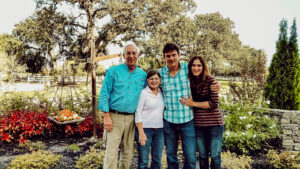 We want to give a warm welcome to Dr. Julia Dare, Visiting Professor of Management Sciences. Before Dr. Dare began teaching, she worked in corporate strategy consulting and global management in the biopharmaceutical industry. Since Dr. Dare made the transition into academia, she says, “Inspiring and equipping my students is pure joy.”
We want to give a warm welcome to Dr. Julia Dare, Visiting Professor of Management Sciences. Before Dr. Dare began teaching, she worked in corporate strategy consulting and global management in the biopharmaceutical industry. Since Dr. Dare made the transition into academia, she says, “Inspiring and equipping my students is pure joy.”
Dr. Dare currently teaches courses in Strategic Management, and International Business, integrating Business Ethics and CSR, which are the fields that she worked in before she began teaching.“I fought some serious corporate ethical battles with God as my shield, compass, and strength. He never fails. My passion for traveling to different countries and enculturation began in the spring semester of my junior year at SMU. I studied abroad in Paris, and all of our courses were taught in French. I lived with a French family and quickly became a Parisienne. My friends and I decided to buy a Eurail pass and left every weekend to a different country. Our backpacking adventures were unforgettable. I stayed the summer in Europe to dive into as many countries and cultures we had yet to explore. None of us returned to America the same. We had become citizens of Europe and rather fearless. What seemed critical to us before our experience overseas seemed like foolishness after coming home. It’s a great analogy of the transformation we experience in laying our old life down with its rituals and idols to follow Jesus. He turns our worldly desires upside down when He opens our eyes to true riches as we radically pursue Him. When we become Kingdom citizens our lives are never the same. All other adventures fall short of life with our omnipotent Savior.”
Dr. Dare says what she enjoys most about teaching students is that “They come to class seeking truth, wisdom, and their calling. My students are excited to learn about global business, different cultures, ethical dilemmas, and how to navigate their careers with purpose and pursue God. We dive into these areas in each course but go deeper outside of class. After graduation, helping my students flourish as they pursue their unique calling is pure joy.”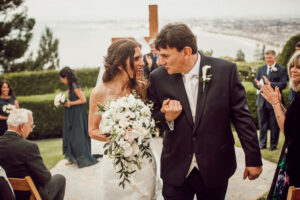
Moving to Texas to teach has been an adjustment but Dare said that she is looking forward to learning “the depth and width of this assignment. My students teach me every semester and the hearts of my colleagues are Texas-sized. ACU is a powerful force for God’s Kingdom. I’m thrilled the Lord planted me here in this season of creation and transformation.”
Dr. Dare’s world-wide experiences have greatly influenced her passions and hobbies outside of teaching. She told us she really enjoys, “Skiing in Tahoe & the Swiss Alps, scuba diving the Great Barrier Reef and French Polynesia, connecting with God’s people and the ones He’s pursuing in countries around the world, Hope & Grace (my longhaired blonde and black & tan mini dachshunds), my irreplaceable family & friends who have become sisters, sailing to Catalina, hiking to hidden waterfalls through unmarked terrain, writing poetry, rugged coastal beauty, and getting lost in worship.”
Something that students might be surprised to find out about Dr. Dare is that: “My sister-in-law & niece are Taiwanese and my husband is South African. We have all lived & traveled across continents, so we are a very international family!”
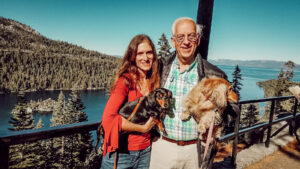 To close, Dr. Dare wanted students to know, “Coming to Abilene from California is such an adventure. I specifically came for ACU students, so please don’t be shy. Join our small chapel group, stay after class, ask to meet, or find me walking Hope & Grace around campus. You are the reason I’m here — to strengthen and inspire you to pursue Jesus and His will for your life.”
To close, Dr. Dare wanted students to know, “Coming to Abilene from California is such an adventure. I specifically came for ACU students, so please don’t be shy. Join our small chapel group, stay after class, ask to meet, or find me walking Hope & Grace around campus. You are the reason I’m here — to strengthen and inspire you to pursue Jesus and His will for your life.”
by Katherine Norris | Sep 22, 2020 | Academics, Accounting, COBA Faculty, Faculty Testimonials, Faith Infusion, Financial Management, Uncategorized
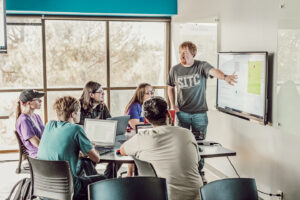
Pre-COVID-19: Dr. James Prather with SITC students
COVID-19 has brought changes and challenges all across the country, including the ACU campus. From the middle of the spring semester to the current fall semester, our faculty have continuously adjusted how they deliver their class material and how to interact with their students. We interviewed Dr. Laura Phillips (’88), associate professor of management, Clint Buck, assistant dean and instructor of accounting, and Dr. Don Pope, associate professor of management to hear about their experiences teaching during the pandemic and how they are working to overcome the challenges that it has presented.
What challenges has COVID-19 brought to the classroom?
Phillips: “My challenges were in the spring and Maymester terms. In the spring I was teaching two semesters of stats that were supposed to start the week after spring break. When we took that extra week off to regroup, I lost 14% of my semester. Also, since we’d never met in person, I didn’t know any of the students and we had not been able to create a class culture before shifting to online. My other class was supposed to be a one-week Maymester in Dallas with about 20 guest speakers and several field trips. That class went virtual as well, which was a huge shift.”
Buck: “FACE MASKS! While I understand the need for face masks, they pose a great challenge in the classroom. It’s hard to ‘read’ the classroom and see if concepts are making sense, if jokes are landing, etc., and it is also hard to teach while wearing a mask. Seeing people’s faces, sending and receiving smiles, and shaking hands are all actions relied upon in the past to establish and nurture connection and community – hallmarks of the COBA and ACU experience. The current realities are forcing us to rethink how we establish and nurture our community, which is very challenging.”
Pope: “The inability to talk with and help students face to face, along with reduced interaction with faculty and staff colleagues.”
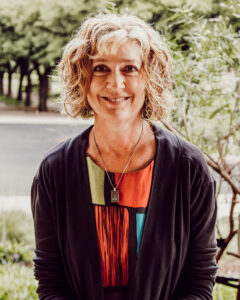
Dr. Laura Philips
What did you do to overcome those challenges?
Phillips: “Lots of trial and error! We’d try some things for a week in stats, and if it wasn’t working, we’d make adjustments for the next week. My coworkers were all very supportive but since we were working remotely and everyone was scrambling, there wasn’t a lot of time to sit around and think philosophically about how we should approach our classes. My schedule didn’t always allow me to attend but the weekly COBA Zoom prayer times have been great! And throughout the summer, the staff in the Adams Center and the crew they assembled to provide resources and training for the faculty have been outstanding.”
Buck: “My teaching colleagues have been invaluable in navigating these issues, and they have also been helpful in the tactical aspects of the job (great suggestions for teaching online and in a distanced classroom, things to look for, things to avoid, etc.). My administrative colleagues have been very good to normalize the challenges we face. It is not easy to be a good employee, a good spouse, and a good parent while navigating a global pandemic, and I am grateful for their faithful demonstration of grace throughout this season.”
Pope: “Through the use of technology tools – online teaching in Canvas and Zoom, we carry on and push through. I would like to compliment the IT people in the background here who work tirelessly ‘below the radar’ and receive little thanks. I would also like to thank the educational technology support staff in the Adams Center and the Library. They are amazing.”
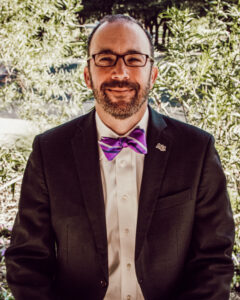
Clint Buck
What’s different about the current fall semester?
Phillips: “I can’t really address this question because I’m teaching online this semester. I am taking German, so I’ve experienced the classroom as a student, but not as a professor.”
Buck: “Can’t shake hands or see smiles; can’t see if a concept or idea is resonating or not. Things I took for granted – like handing out printed material in class! – are very noticeable in their absence. Also, I used to enjoy having a very special teaching assistant in class at least once each semester, but my eight-year-old daughter (Lillian) is unable to do so this semester. :( EVERYONE is very sad about this.”
Pope: “My classes ended up all being online this semester, so obviously that is really different. But when I/we return to in-person classes again, I plan to utilize many of the recorded lectures and clarified teaching materials that have been developed during the pandemic. In the past, I relied too much on being able to verbally explain something, and now I see that some of my notes are not very clearly written. So, the current situation is an opportunity to see things differently and learn and grow.”
COBA’s vision is to inspire, equip, and connect Christian business and technology professionals to honor God and bless the world. How are you integrating the vision with your students when you can’t always be with them?
Phillips: “I don’t start teaching until October this semester so most of my interaction with students is coming through a community group I’m leading for some COBA freshmen and meeting with students about study abroad next fall. I’m trying to stay connected to students even though I’m not in the classroom. I guess right now I’m spending a lot of time trying to inspire them to spend a semester abroad. It is such a transformational experience but sometimes it’s hard for students to visualize themselves doing something so vastly different from their normal life. I’m also trying to help some of our freshmen connect in our small group. They have such a great attitude but I think it’s harder to get to know people with the masks and social distancing in the classrooms. I’m hoping that our community group helps them get to know a handful of their COBA peers and that they will have a few classmates with whom they have connected at a deeper level.”
Buck: “I’m working hard to use Canvas better so information is accessible and organized for students.”
Pope: “In terms of connection, I am trying to encourage more emailed thoughts about prayer needs, scripture, and other personal concerns. My wife has, for 20 years, invited students into our home for meals and we typically have had large groups. This fall, she is going to considerable effort to plan, prepare, and host multiple smaller groups in a safe manner.”
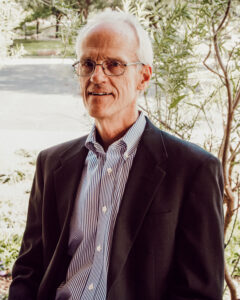
Dr. Don Pope
What are you excited about for this semester?
Phillips: “Getting to know some of our new freshmen, seeing students get excited about spending a semester abroad, ‘meeting’ my students – even though we will not be gathering in person.”
Buck: “Seeing how we expand our vision of community. We’ve relied on very traditional definitions and expressions of community (e.g. shaking hands, sharing a meal, attending a sporting event or attending the performing arts) for a long time, and the current moment forces us to rethink them. When things return to something resembling what we used to call ‘normal’, we will hold these definitions/expressions even more sacred and special than before.”
Pope: “‘Excited’ is probably not a word that we would use about this situation. But, I do think that we are all learning some valuable lessons about the human need to be with other people, to accept each other’s different perspectives on things, and live together in community. It will be interesting to see how family, education, business, and church are changed long term by this experience.”
While the ACU campus looks and works differently in 2020, COVID-19 hasn’t stopped faculty members from looking for ways to put students first. Echoed in the comments of each of our faculty members is the theme that is so central to ACU – community. We value our students and our relationships with them as faculty and staff. We will continue to strive to connect in the best ways possible this semester and we look forward to the day that we can see those smiles in the classroom.
by Katherine Norris | Nov 12, 2019 | Academics, City of Abilene, COBA Faculty, Faculty Testimonials, Faith Infusion, Uncategorized
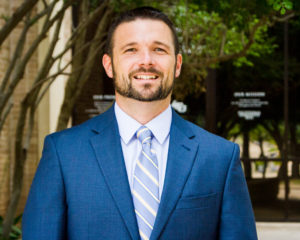
Dr. Dennis Marquardt
Dr. Dennis Marquardt, Assistant Professor of Management and Director of the Lytle Center for Faith and Leadership, is one of the great examples in COBA of a well-developed, strong, and Christ-like individual. He says, “I often laugh at the thought of telling my 20 year old self that one day he would be a college professor. The idea of being a professor was not even in the realm of my thought space when I graduated from college. My plan was to work a year in a business-related job and try to get into law school. Instead, for some reason, as an organizational communication major, I ended up getting hired for a tax and compliance job at Bankers Trust (which was soon acquired by Deutsche Bank). I really enjoyed the work I did for DB and started an MBA program with plans to continue my business career.”
Dr. Marquardt does well to share his experiences in the classroom and apply the class concepts to his failures and his accomplishments. The humility and grace that he shows earns him the highest respect from his students to his coworkers. Part of that is an incredible amount of faith that he shows through his actions and choices. “I’ve always prayed heavily for each career path I’ve been presented with and asked a lot of advice from others to get a wiser and more well-rounded faith-based perspective. It’s usually when I look in the rear-view mirror that I see God’s direction in my journey most clearly. Most of all, I am overwhelmed by His grace and mercy for the many times I’ve failed and/or chosen the wrong path (and that’s happened more than I’d like to admit).“
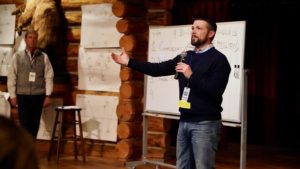
Marquardt teaching at Leadership Summit
When asked if and how his faith plays a role in his teaching he was enthusiastic to talk about how he sees God working through COBA. This was his response: “Absolutely. As a management professor, I see the role of “manager” as an incredibly noble calling. The research is quite conclusive regarding the significant impact a supervisor has on the subjective well-being and overall quality of life of his or her subordinates. What an incredible opportunity management is, then, for people of faith to live out the servant life promoted by Christ. I think much of the Human Relations movement in management is not only conducive to but also indirectly (and sometimes directly) draws from the characters and virtues found in the teachings and life of Jesus. One of my priorities is to make these connections evident in the classroom and to help students see that faith does impact our careers and should create cycles of virtue in the lives of employees and customers alike.”
Dr. Marquardt responded with this wisdom when asked what he has learned since being at COBA: “ACU and COBA values relationships and creates settings that allow for a more holistic approach to learning that spans beyond the four walls of the classroom. I think this is one of the key differentiators for ACU and it provides a mutual learning environment for professors and students. Not only do I get to facilitate learning but I am also challenged and sharpened by my students as I see them wrestling with new ideas and living and working out their own faith.”
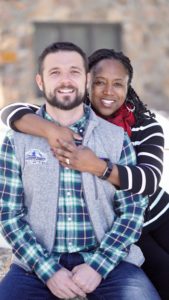
Dennis and Monique Marquardt
Final Words: “Early in my teaching career I became deeply convicted about the intrinsic value potential of each and every class session. Each time students come into a classroom with any instructor I think there is something almost sacred about the possibilities. I was recently reminded of a poem by former longtime President of Morehouse College and spiritual mentor to Martin Luther King, Jr., Dr. Benjamin E. Mays that conveys this point:
I have only just a minute,
Only sixty seconds in it.
Forced upon me, can’t refuse it.
Didn’t seek it, didn’t choose it.
But it’s up to me
to use it.
I must suffer if I lose it.
Give account if I abuse it.
Just a tiny little minute,
but eternity is in it.
by Maddy Crockett | Oct 22, 2019 | Academics, COBA Faculty, Faculty Testimonials, Faith Infusion
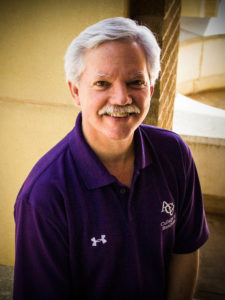
Dr. Monty Lynn
Dr. Monty Lynn, a staple in the College of Business, has been teaching at ACU for over thirty years. Lynn is the one of the first professors business students take courses from, as he teaches the Intro to Business class required for beginning business students. He is also active outside of the classroom, taking groups on study abroad trips and conducting research for COBA.
Yet, teaching was not always on his radar. Although higher education felt comfortable to him, as he has family in that career field, Lynn shared, “Before and during college, I explored several career paths – architecture, public health, social work, urban family planning, and a few others. I enjoy learning and find a lot of subjects interesting.” During his last semester of graduate school, however, he interviewed for positions with business, consulting, and teaching organizations. Once he honed in on business, the rest fell into place. After he and his wife, Libby, visited ACU, Lynn explained that “Higher education felt like a great fit. Thankfully, the business faculty agreed to give me a try. That was 35 years ago.”
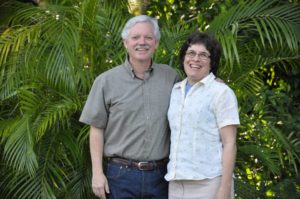
Monty and Libby Lynn
When asked about the role faith has played in his journey, Lynn looks back to his upbringing in a family of faith, along with his fascination with how people relate to God and how God relates to people. With his father being a minister, he spent a good amount of time at church. As a teenager, he enjoyed broadening his experiences by attending Sabbath services and mass at a local synagogue and a parish. “Schooling in secular and faith-based colleges shaped me as well,” he explained, “as have years of life in a local community of faith”. When he started his career at ACU, Lynn initially faced some challenges. He struggled with doubt about God and questions about faith, but, “Over time, I came to peace with many of my questions.” This perspective shift came from several sources. “A Walk to Emmaus connected my head and heart, the example of friends continues to teach me, and sharing with others in weekly prayer and reading groups has blessed me”. Lynn feels a great deal of gratitude for his journey and for what is to come.
By teaching business courses, Lynn hopes that “[My] faith leavens who I am and what I do, regardless of where I am or what I’m doing.” He went on to explain how he must be intentional not to allow faith and work to migrate into parallel – but separate – spheres of life, as “It’s not too difficult to encounter value differences between the marketplace and in the way of Jesus.” Lynn’s aim is to emphasize the unique call of faith in life throughout the courses he teaches, and he is grateful that ACU has an abundance of resources available for spiritual formation. “It is truly unique and a joy”, he says, “to journey with students and colleagues. There’s so much more we have to learn and live together.”
Lynn also embraces the role as researcher. “I love to dig into ideas”, Lynn expressed. Scholarly opportunities are scarce at many faith-based institutions and he has been grateful that ACU and COBA encourage scholarly growth. Students and faculty alike are grateful for the steady presence Dr. Monty Lynn has been through the years. We look forward to learning and growing more from him in the years to come.
by Maddy Crockett | Oct 8, 2019 | Accounting, COBA Faculty, COBA Staff, Faculty Testimonials, Faith Infusion
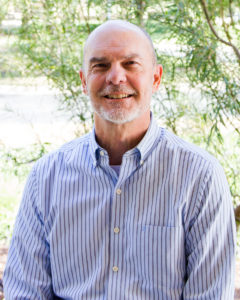
Dr. David Perkins
A common theme among our faculty members is how many of them did not plan to become a professor after graduating college. This, too, was the case for Dr. David Perkins. In fact, teaching wasn’t even a thought for him until a position opened up at Harding University, his alma mater. When the dean called and asked him to teach principles of accounting, Perkins was almost through his MBA program, so he accepted the temporary position for a year. “That phone call was a life-changing event for me. I look at it as God giving me a nudge to consider teaching as a career”.
Perkins taught at Harding for 15 years after that, then joined the COBA family during its initial work to become AACSB accredited. His friend and college classmate, Dr. Monty Lynn, was a good contact for him at ACU while Perkins was making the arrangements to join the COBA faculty. Dr. Perkins was ready for a change, and has never regretted getting on board with COBA’s vision for excellence. He currently teaches Financial Accounting to undergraduates as well as graduate classes in the Master of Accountancy (MAcc) program and has led students on numerous study abroad programs with COBA.
When Perkins began to think about the impact of faith in his journey, he shared that it was humbling experience. “God opens doors of opportunity and sometimes he shuts others. That certainly helps with the decision-making process.” It is difficult for him to imagine what life would be like without faith, as it has played such a core part of his journey. He stressed that his faith doesn’t guarantee that he won’t ever doubt; still, in the midst of doubt, growth can be found. “God is my anchor” Perkins said. “Even when I stumble or stray, I know where to find Him… right there where He’s always been.”
Dr. Perkins explained that he enjoys teaching accounting not only to help students prepare for their future careers, but also in giving them more tools to make a better life. While initially Perkins wasn’t sure how different his teaching method was from other accounting classes at public schools, he’s been able to be more intentional about planting seeds in students’ minds that can grow into faith. He explained that in class, he will “Try to apply the topics we cover to real life decisions so they will be positioned to make good choices.” Students who have had Perkins in class fondly recalled the ‘sermonettes’ he shared with them from time to time and were grateful for the weekly Bible study he offers outside of class for anyone willing to attend.

Dr. Perkins with students this summer during Study Abroad to Oxford and Leipzig.
Dr. Perkins explained that his desire for students is for them to see college as an opportunity to develop their God-given skills – even if they don’t know what they want to do yet. He remembered being in a similar position at their age, of being unsure about what life would look like after college. His best advice was this, “Develop your talents, develop your character, develop friendships, develop your faith… then see what opportunities God brings your way”.
ACU is fortunate and thankful to have Dr. Perkins – not only for his knowledge and wisdom, but for his character and heart for his students.
 Written by special contributor Lance Fleming
Written by special contributor Lance Fleming We want to give a warm welcome to Dr. Julia Dare, Visiting Professor of Management Sciences. Before Dr. Dare began teaching, she worked in corporate strategy consulting and global management in the biopharmaceutical industry. Since Dr. Dare made the transition into academia, she says,
We want to give a warm welcome to Dr. Julia Dare, Visiting Professor of Management Sciences. Before Dr. Dare began teaching, she worked in corporate strategy consulting and global management in the biopharmaceutical industry. Since Dr. Dare made the transition into academia, she says,
 To close, Dr. Dare wanted students to know,
To close, Dr. Dare wanted students to know, 









